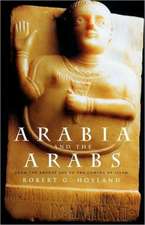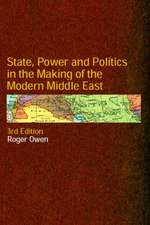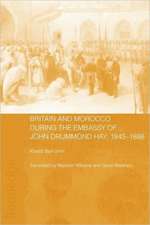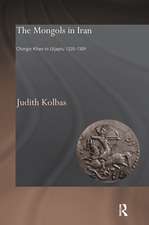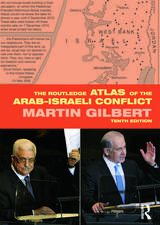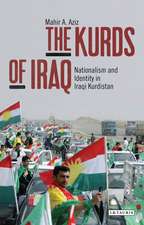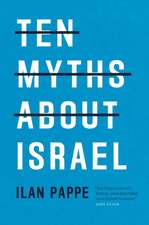Arab Nationalism: The Politics of History and Culture in the Modern Middle East
Autor Peter Wienen Limba Engleză Hardback – 7 feb 2017
Arab Nationalism sheds light on cultural expressions of Arab nationalism and the sometimes contradictory meanings attached to it in the process of identity formation in the modern world. It presents nationalism as an experienceable set of identity markers – in stories, visual culture, narratives of memory, and struggles with ideology, sometimes in culturally sophisticated forms, sometimes in utterly vulgar forms of expression. Drawing upon various case studies, the book transcends a conventional history that reduces nationalism in the Arab lands to a pattern of political rise and decline. It offers a glimpse at ways in which Arabs have constructed an identifiable shared national culture, and it critically dissects conceptions about Arab nationalism as an easily graspable secular and authoritarian ideology modeled on Western ideas and visions of modernity.
This book offers an entirely new portrayal of nationalism and a crucial update to the field, and as such, is indispensable reading for students, scholars and policymakers looking to gain a deeper understanding of nationalism in the Arab world.
| Toate formatele și edițiile | Preț | Express |
|---|---|---|
| Paperback (1) | 383.67 lei 3-5 săpt. | +21.16 lei 7-11 zile |
| Taylor & Francis – 20 feb 2017 | 383.67 lei 3-5 săpt. | +21.16 lei 7-11 zile |
| Hardback (1) | 850.17 lei 6-8 săpt. | |
| Taylor & Francis – 7 feb 2017 | 850.17 lei 6-8 săpt. |
Preț: 850.17 lei
Preț vechi: 1141.91 lei
-26% Nou
Puncte Express: 1275
Preț estimativ în valută:
162.67€ • 169.86$ • 134.33£
162.67€ • 169.86$ • 134.33£
Carte tipărită la comandă
Livrare economică 15-29 aprilie
Preluare comenzi: 021 569.72.76
Specificații
ISBN-13: 9780415499378
ISBN-10: 0415499372
Pagini: 296
Ilustrații: 28
Dimensiuni: 156 x 234 mm
Greutate: 0.59 kg
Ediția:New.
Editura: Taylor & Francis
Colecția Routledge
Locul publicării:Oxford, United Kingdom
ISBN-10: 0415499372
Pagini: 296
Ilustrații: 28
Dimensiuni: 156 x 234 mm
Greutate: 0.59 kg
Ediția:New.
Editura: Taylor & Francis
Colecția Routledge
Locul publicării:Oxford, United Kingdom
Public țintă
Postgraduate and UndergraduateCuprins
1. Introduction: A Critique of Arab Nationalism
2. The Trials and Tribulations of the Poet Fu’ad al-Khatib: A Biographical Essay on the Origins of Arab Nationalism
3. Holding Up the Mirror: Imperialism and the Poetics of Cultural Pan-Arabism
3.1. Saladin the Victor: National Saints, Great Men, and the Rise of the Individual
3.2. From the Glory of Conquest to Paradise Lost: Al-Andalus in Arab Historical Consciousness
4. Of Kings and Cavemen: Museums and Nationalist Museology in Twentieth Century Egypt
5. Damascus Transfers: Dead Bodies and their Translocal Meanings
6. Nearly Victorious: The Art of Staging Arab Military Prowess
7. Arab Nationalism, Fascism and the Jews
8. Epilogue and Conclusion: Broken Narratives
2. The Trials and Tribulations of the Poet Fu’ad al-Khatib: A Biographical Essay on the Origins of Arab Nationalism
3. Holding Up the Mirror: Imperialism and the Poetics of Cultural Pan-Arabism
3.1. Saladin the Victor: National Saints, Great Men, and the Rise of the Individual
3.2. From the Glory of Conquest to Paradise Lost: Al-Andalus in Arab Historical Consciousness
4. Of Kings and Cavemen: Museums and Nationalist Museology in Twentieth Century Egypt
5. Damascus Transfers: Dead Bodies and their Translocal Meanings
6. Nearly Victorious: The Art of Staging Arab Military Prowess
7. Arab Nationalism, Fascism and the Jews
8. Epilogue and Conclusion: Broken Narratives
Notă biografică
Peter Wien teaches at the University of Maryland in College Park and currently serves as President of The American Academic Research Institute in Iraq (TAARII).
Descriere
This book sheds light on cultural expressions of Arab Nationalism and the contradictory meanings often attached to it. It presents nationalism as an experienceable set of identity markers – in stories, visual culture, narratives of memory and struggles with ideology. Using case studies, the book transcends a conventional history that reduces nationalism in the Arab lands to a pattern of political rise and decline. It suggests Arabs have constructed an identifiable shared national culture, and it critically dissects conceptions about Arab nationalism as an easily graspable secular and authoritarian ideology modelled on Western ideas and visions of modernity.


